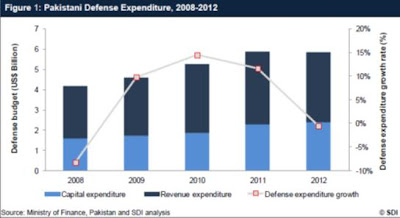During the review period (2008-2012), the total
defense expenditure of Pakistan increased at a CAGR of 8.70% to value US$5.8
billion in 2012, excluding US$1.2 billion of US military aid. As a result, the
country was the world’s third-largest importer of arms during 2007–2011 as per
Stockholm International Peace Research Institute (SIPRI). Furthermore, defense
expenditure is expected to record a CAGR of 9.18% over the forecast period, to
value US$8.9 billion by 2017 (see graph below).
Due to the lack of a structured defense budgeting
policy until 2008, the Pakistani defense industry has experienced widespread
corruption in the use of allocated funds. Although defense procurements are
supposed to be made through competitive bidding, this rule is not strictly
enforced, which leads to a lack of transparency in the awarding of defense
deals. Furthermore, while efforts have been made to streamline the defense
budget, Pakistan does not disclose the portion of US military aid assigned for
expenses.
Pakistan often aligns its defense procurement
strategy with that of India, with which it is in territorial dispute, so that
its armed forces will be equal in the event of an armed conflict. As a result,
Pakistan continues to increase its defense budget despite its relatively small
economy. However, Pakistan’s dispute with India has begun to effect its
relations with other supplying counties. The US is currently reviewing its arms
supplies to Pakistan on the grounds that the country is amassing the systems to
use in conflict with India.
The increased internal instability of the country
following the onset of its participation in the international military campaign
against terrorism, which is widely referred to as the ‘war on terror’, will
continue to drive Pakistani defense expenditure over the next five years.
Moreover, the nation’s long-standing territorial dispute with neighboring India
means that the Pakistani defense strategy will largely correspond with India’s
spending and development programs.
Inquire a Discount
Copy @ http://www.rnrmarketresearch.com/contacts/discount?rname=69376
This
report offers insights into the market opportunities and entry strategies
adopted by foreign OEMs (original equipment manufacturers) to gain a market
share in the Pakistani defense industry. In particular, it offers in-depth
analysis of the following:
- Market opportunity and attractiveness
- Procurement dynamics
- Industry structure
- Market entry strategy
- Competitive landscape and strategic insights
- Business environment and country risk
Reasons to buy
- Provides detailed analysis of the current industry size and growth expectations from 2013 to 2017, including highlights of key growth stimulators, and also benchmarks the industry against key global markets and provides a detailed understanding of emerging opportunities in specific areas.
- Includes trend analysis of imports and exports, together with their implications and impact on the Pakistani defense industry.
- Allows readers to identify possible ways to enter the market, together with detailed descriptions of how existing companies have entered the market, including key contracts, alliances, and strategic initiatives.
- The report helps the reader to understand the competitive landscape of the defense industry in Pakistan. It provides an overview of key defense companies, both domestic and foreign, together with insights such as key alliances, strategic initiatives, and a brief financial analysis.

No comments:
Post a Comment
Note: only a member of this blog may post a comment.